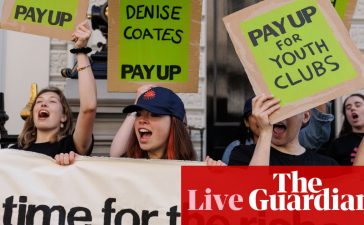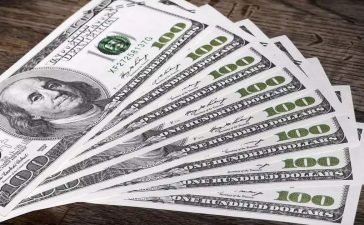History shows that September is the worst month of the year for stock markets and here we go again as US markets have fallen for three weeks in a row. Analysts are warning there is worse to come as share prices could plunge 50 percent in total, smashing global wealth.
Yesterday, the Dow Jones index plunged by nearly 400 points in its worst day since March. The S&P 500 fell by 1.47 percent while the tech heavy Nasdaq beat that and is down almost seven percent this month alone.
It’s a bloodbath out there, as the US faces a heap of economic worries.
New home sales fell by 8.7 percent in August, according to the Commerce Department, while the Conference Board reports that consumer confidence expectations have fallen to recession levels.
The big worry is that the US Federal Reserve will have to carry on hiking interest rates as it battles to curb inflation.
While the Fed kept rates steady at 5.5 percent in September this was described as a “hawkish hold” after chair Jay Powell warned of more hikes to come
Top US banker JPMorgan CEO Jamie Dimon has warned interest rates could hit seven percent which would hammer markets and trigger a massive global recession.
At the same time, bonds are yielding income of as much as six percent a year, the highest since 2007, giving investors a decent return without the risk of investing in equities.
Sam Stovall, chief investment strategist at CFRA research said: “Investors are still on edge, nervous, about what rising bond yields have to say about the economy, about the stock market, about the Fed.”
The Fed’s “higher interest rates for longer” rhetoric is persuading investors to dump high-risk assets like shares, said Chris Beauchamp, chief market analyst at trading platform IG. “September’s reputation as one of the worst months for stocks has been bolstered.”
Appetite for risk among investors keeps decreasing everywhere due to lingering inflation, said Pierre Veyret, technical analyst at ActivTrades.
Many are also spooked by the prospect of a US government shutdown after Congress failed to pass a short-term spending bill, Veyret added. “This would further dent confidence in the nation’s credit rating and economic outlook.”
Investors are also worried about China after the country’s embattled property giant Evergrande defaulted on a £450m debt repayment, casting a shadow over the world’s second-biggest economy. “Dark clouds continue to pile up for investors,” Veyret said.
So far, the UK has escaped the worst of the carnage. London’s benchmark FTSE 100 index of blue-chip stocks is actually up 2.2 percent so far in September.
It’s even holding steady today. How come?
READ MORE: Stock markets hit ‘puke point’ as high interest rates trigger violent 50% crash
Last week, the Bank of England surprised and delighted investors by holding interest rates at 5.25 percent, while signalling they have reached their peak. That certainly helped.
The FTSE 100 is often seen as a “defensive” index, as it is full of solid old school stocks in the banking, mining, tobacco and insurance sectors.
These are currently paying dividend yields of as much as seven percent or eight percent, giving bond yields a run for their money.
Cynics might say that the FTSE 100 hasn’t risen much lately – in contrast to the US – so it hasn’t got as far to fall.
However, Beauchamp warned that rising US interest rates and the worsening economic outlook is a dangerous cocktail for the FTSE 100, too.
Investors are “jittery” and the pound is on track for its worst month since last autumn’s mini-Budget fiasco, said Victoria Scholar, head of investment at Interactive investor. “This reflects the increased risk of a UK recession as rising borrowing rates weigh on the economy. “
As ever, some brave investors will see today’s struggles as a buying opportunity.
September’s troubles may only be a dip before a year-end stock market rally, said Mathieu Racheter, head of equity strategy research at private bank Julius Baer.
As 2023 draws to a close, investors will look forward to an interest rate cut in 2024. “Since the early 1970s, evidence suggests that equity returns tend to be good following the last rate hike.”
Yet even Racheter urged investors to stick to larger companies and “defensive” stocks to cope with the ongoing turbulence.
Things could get worse before they get better. Much worse. Especially in the US.










